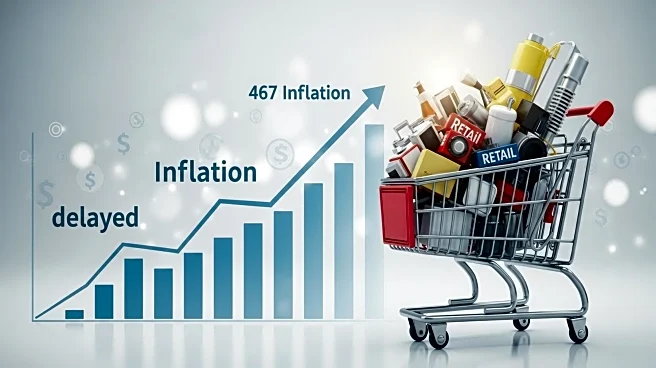What's Happening?
The retail industry is experiencing the delayed effects of cost-push inflation, which has significantly altered profit margins and consumer behavior over the past five years. Initially, retailers absorbed rising costs from tariffs, wages, and commodity prices by compressing margins, delaying price hikes to maintain customer loyalty. However, this strategy proved unsustainable, leading to elevated retail margins and reduced investment. The grocery sector, in particular, has been affected by increased input costs, resulting in job cuts and reduced investment. Consumer behavior has shifted towards affordability, with a rise in private-label product adoption, accounting for 21.7% of U.S. retail sales by February 2025. Retailers like Walmart and Kroger have expanded their private-label portfolios, offering high-quality products at competitive prices.
Why It's Important?
The delayed impact of inflation has created a bifurcated retail landscape, where companies that adapt through innovation and strategic pricing thrive, while others struggle. This shift has significant implications for investors, who can benefit by focusing on private-label leaders, supply chain innovators, and essential goods retailers. Companies like Walmart and Kroger are leveraging private-label expansion to capture market share and maintain margins. Supply chain innovations, such as AI-driven inventory systems and nearshoring, are helping retailers manage inflationary pressures. As consumers prioritize necessities, retailers focused on groceries and household goods are gaining traction, offering investment opportunities in a transformed retail landscape.
What's Next?
Retailers are expected to continue adapting to inflationary pressures through strategic innovations and pricing models. The focus will likely remain on expanding private-label offerings and modernizing supply chains to enhance resilience. Investors may look to support companies that embrace agility and focus on essential goods, as these sectors are less sensitive to economic cycles. The Federal Reserve's PCE price index indicates a potential waning of high inflation, but its structural effects on retail will persist, influencing strategic decisions and investment opportunities.
Beyond the Headlines
The shift towards private-label products and supply chain innovations highlights broader trends in consumer behavior and retail strategy. The emphasis on affordability and quality reflects changing consumer priorities, while technological advancements in supply chain management underscore the industry's move towards efficiency and resilience. These developments may lead to long-term shifts in retail dynamics, with implications for consumer loyalty, brand equity, and competitive positioning.










